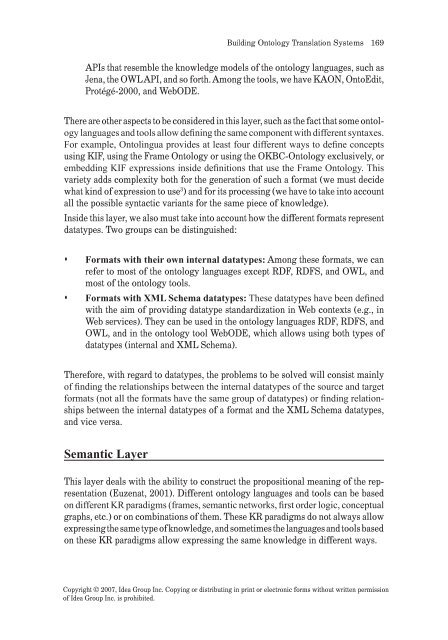Semantic Web-Based Information Systems: State-of-the-Art ...
Semantic Web-Based Information Systems: State-of-the-Art ...
Semantic Web-Based Information Systems: State-of-the-Art ...
Create successful ePaper yourself
Turn your PDF publications into a flip-book with our unique Google optimized e-Paper software.
Bu ld ng Ontology Translat on <strong>Systems</strong><br />
APIs that resemble <strong>the</strong> knowledge models <strong>of</strong> <strong>the</strong> ontology languages, such as<br />
Jena, <strong>the</strong> OWL API, and so forth. Among <strong>the</strong> tools, we have KAON, OntoEdit,<br />
Protégé-2000, and <strong>Web</strong>ODE.<br />
There are o<strong>the</strong>r aspects to be considered in this layer, such as <strong>the</strong> fact that some ontology<br />
languages and tools allow defining <strong>the</strong> same component with different syntaxes.<br />
For example, Ontolingua provides at least four different ways to define concepts<br />
using KIF, using <strong>the</strong> Frame Ontology or using <strong>the</strong> OKBC-Ontology exclusively, or<br />
embedding KIF expressions inside definitions that use <strong>the</strong> Frame Ontology. This<br />
variety adds complexity both for <strong>the</strong> generation <strong>of</strong> such a format (we must decide<br />
what kind <strong>of</strong> expression to use 3 ) and for its processing (we have to take into account<br />
all <strong>the</strong> possible syntactic variants for <strong>the</strong> same piece <strong>of</strong> knowledge).<br />
Inside this layer, we also must take into account how <strong>the</strong> different formats represent<br />
datatypes. Two groups can be distinguished:<br />
• Formats.with.<strong>the</strong>ir.own.internal.datatypes: Among <strong>the</strong>se formats, we can<br />
refer to most <strong>of</strong> <strong>the</strong> ontology languages except RDF, RDFS, and OWL, and<br />
most <strong>of</strong> <strong>the</strong> ontology tools.<br />
• Formats.with.XML.Schema.datatypes: These datatypes have been defined<br />
with <strong>the</strong> aim <strong>of</strong> providing datatype standardization in <strong>Web</strong> contexts (e.g., in<br />
<strong>Web</strong> services). They can be used in <strong>the</strong> ontology languages RDF, RDFS, and<br />
OWL, and in <strong>the</strong> ontology tool <strong>Web</strong>ODE, which allows using both types <strong>of</strong><br />
datatypes (internal and XML Schema).<br />
Therefore, with regard to datatypes, <strong>the</strong> problems to be solved will consist mainly<br />
<strong>of</strong> finding <strong>the</strong> relationships between <strong>the</strong> internal datatypes <strong>of</strong> <strong>the</strong> source and target<br />
formats (not all <strong>the</strong> formats have <strong>the</strong> same group <strong>of</strong> datatypes) or finding relationships<br />
between <strong>the</strong> internal datatypes <strong>of</strong> a format and <strong>the</strong> XML Schema datatypes,<br />
and vice versa.<br />
<strong>Semantic</strong>.Layer<br />
This layer deals with <strong>the</strong> ability to construct <strong>the</strong> propositional meaning <strong>of</strong> <strong>the</strong> representation<br />
(Euzenat, 2001). Different ontology languages and tools can be based<br />
on different KR paradigms (frames, semantic networks, first order logic, conceptual<br />
graphs, etc.) or on combinations <strong>of</strong> <strong>the</strong>m. These KR paradigms do not always allow<br />
expressing <strong>the</strong> same type <strong>of</strong> knowledge, and sometimes <strong>the</strong> languages and tools based<br />
on <strong>the</strong>se KR paradigms allow expressing <strong>the</strong> same knowledge in different ways.<br />
Copyright © 2007, Idea Group Inc. Copying or distributing in print or electronic forms without written permission<br />
<strong>of</strong> Idea Group Inc. is prohibited.


